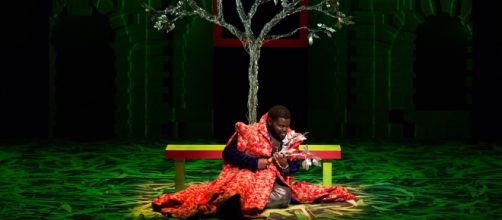Glimmerglass Festival’s new production of Georg Friedrich Händel’s “Xerxes” debuted Saturday, July 15, to a sold-out crowd. In a preview article, Everything Music and Theatre tried to warn you of the tangled web woven among the seven characters. Now the warning is this: If you don’t hurry and snap up tickets for one of just five remaining performances, you will miss this shimmering Baroque gem presently gleaming in Glimmerglass Festival’s glowing 2017 season. Maestra Nicole Paiement at the helm of orchestral and vocal forces produces a spirited reading of the ingenious score.
Emperor Xerxes
Countertenor John Holiday Jr. portrays the lovelorn emperor of the Persian world power. His must be the highest countertenor voice around without resorting to falsetto, or head voice. Rather, he produces a full-chested soprano sound, glories in legato and cantilena and isn’t the least troubled by the perils of fioriture (vocal embellishments). Mr. Holiday’s bookend arias—“Ombra mai più” as curtain raiser, and “Crude furie degli orridi abissi” during the Act III finale—are perfect vehicles to display such widely diverse vocal styles and techniques, and he carries them off with beauty of tone and panache.
Rival sisters
Sopranos Emily Pogorelc and Katrina Galka cattily enact sibling rivalry as sisters Romilda and Atalanta, respectively, while managing to sing divinely.
In Romilda’s brief opening arioso, “O voi che penate” (Oh, you who suffer), Ms. Pogorelc brandishes a real trill and a ravishing messa di voce, a vocal technique far more difficult than it seems: the singer spins a quietly wispy thread of a sustained note, slowly and steadily increases the volume and, just as slowly and steadily, lowers the volume again. Ms. Galka floated a glorious pianissimo in her Act II aria “Voi mi dite che non l’ami” (You tell me not to love him).
The much-desired Arsamenes
Mezzo-soprano Allegra De Vita continues to be a talent to watch as she portrays Emperor Xerxes’ brother Arsamenes, who represents not so much a threat to the throne as competition for Romilda’s hand in marriage, while simultaneously fending off Atalanta’s unwelcome affections.
Ms. De Vita’s warm voice caresses the vocal line whether singing amorously seductive strains or hurling invective in her Act II aria di furia. Thanks to perfectly designed costumes and wigs, she must be the most convincingly male exponent of this trouser role anywhere.
The woman spurned
Mezzo-soprano Abigail Dock inhabits the role of Amastris, whom Xerxes sets aside to pursue Romilda. How refreshing to see a woman spurned who’s not hell-bent on revenge but, rather, on teaching her treacherous beloved a valuable life’s lesson in reconciliation. Ms. Dock exploits the pathos of her role and ennobles the vocal line as Amastris’ noble character reveals progressively.
Supporting roles
Bass-baritone Calvin Griffin is Elviro, Arsamenes’ bumbling servant, who plays his role for laughs, producing a pinched, nasal buffoon’s tone when in disguise as a flower vendor, and otherwise wielding a gorgeous voice that plums the depths for all the pleasure to be had.
Bass Brent Michael Smith is Romilda’s father, Ariodates, vassal to Xerxes, who unwittingly thwarts Xerxes’ designs for Romilda by marrying her to Arsamenes.
Visibly propelling
Händel specialist Maestra Nicole Paiement lends her unique talent to Händel’s colorful score, driving things forward where drive is needed, yet allowing soloists to linger in languid arias without lagging, commandingly marshaling forces in each aria di bravura. The conductor’s podium and, indeed, the entire orchestra, are elevated on risers for Baroque performances, giving a better view of what goes on in the orchestra pit and the pit-to-stage communication between conductor and singers.
The look of ‘Xerxes’
Costume Designer Sara Jean Tosetti could not have found a deeper purple plush velvet for Xerxes’ tunic, worn over silvery leather trousers and boots and yet, without clashing, manage to top it with a bright orange and crimson, heavily brocaded, flowing cloak all aglitter with countless rhinestones.
Sets Designer John Conklin has designed a pleasing, colorful unit set with his trademark geometric hangings and architectural details, usually askew or otherwise off kilter, before a sectional backdrop of the Shushan Palace, which gets shuffled and reconfigured throughout, to reflect the growing disarray in the onstage romantic entanglements.
“Xerxes,” by Georg Friedrich Händel, till Aug. 18, 2017, at Glimmerglass Festival, Alice Busch Opera Theater, Cooperstown, N.Y.


